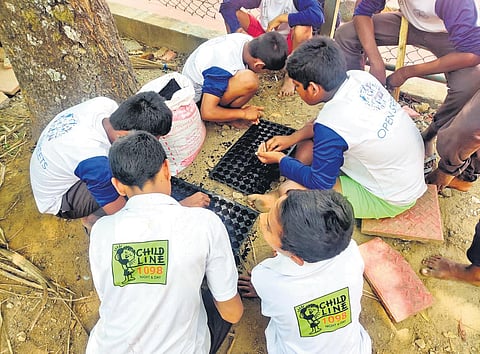

BENGALURU: In the bustling metropolis of Bengaluru, where the Garden City is fighting a tough battle against concretisation, an initiative is redefining the narrative around disabilities, and has thus created a sustainable, scalable project with inclusivity at its core.
“Disability is not a matter of charity; it is a right-based approach. Every individual, regardless of their abilities, has the right to be present in all facets of life, just like the right to education. To truly support people with disabilities, we must embrace a holistic approach that recognises and addresses their comprehensive needs,” says Dr Senthil Kumar, CEO of the Association of People with Disabilities (APD).
Keeping this in mind, the organisation set up an Inclusive Sustainable Horticulture Centre. Situated between Kidwai Memorial Institute of Oncology and NIMHANS, the seven homes housing 425 residents under the Correctional Institutions Complex (CIC) will be provided with sustainable livelihood opportunities, post-training. The facility includes people with diverse needs, with intellectual disabilities, vulnerable women, and children who have been rescued from abuse, abandonment, forced labour, and other unfortunate circumstances.
“The question of whether a garden is necessary for disabled people is not just about plants; it’s about fostering an environment where everyone feels integrated, valued, and included. We wanted to shift our perspective from charity to holism, paving the way for a more inclusive and integrated society where everyone can thrive in the mainstream,” he says. An occupational therapist is also working with 114 screened members, who are already part of the initiative.
Thought for environment
The centre goes beyond conventional notions of rehabilitation and is not confined to four walls; it includes eco-therapy for intellectually disabled men and women and environmental education for children at the Boys and Girls Homes within the complex. With a bonus for the environment, a wet waste management solution will be introduced that will utilise kitchen waste generated within the complex. “Through this programme, someone who has been considered a burden by their families will be productive, financially independent and will also be able to support their families,“ emphasises Dr Kumar.
The roots of inspiration for this transformative project can be traced back to the founder’s connection with nature. Spending time in the serene landscapes of Lalbagh, NS Hema, the Founder of APD, discovered the calming influence nature could have on her mind. She later went on to create a horticulture centre in Jeevan Bhima Nagar. This barren piece of land, once ignored, has now blossomed into a space of renewal and hope for disabled people. The idea also is that nature, when harnessed with purpose, can become a powerful catalyst for change in the lives of those often marginalised by society.
Dr Kumar explains, “When someone is engaged physically, there is also mental engagement. These individuals, for over a month since the project started, have been learning to socialise, help each other and pick up skills that can help them find jobs as gardeners and caretakers in the future.”
The 32,000 sqft horticulture centre is a tripartite collaboration between APD, the Department of Women and Child Development, and Bosch. It was inaugurated in November. The therapeutic training interventions will be done for six months and followed up with six more months of regular practice of skills as a vocation in growing plants and maintaining the nursery.
Shiva Hiremath, Director – Policy and Advocacy, APD, says that when a small team visited all the homes and did an intervention, they found that not all the homes can give holistic growth to their inmates. “The government doesn’t have the funds or manpower to do that. We wanted to make them a part of the society. This centre should become a long-term impactful project. Even for the staff who are stressed with handling the inmates, ecotherapy can be a positive reinforcement,” says Hiremath.
As a side note, he also opines that just putting inmates in cells is not comprehensive rehabilitation. “In the coming years, mental illnesses are going to be the largest disabilities. Replicating this model will be good, which will help the environment and also be a way for people to de-stress while learning new skills,” he shares.
The carefully designed centre attempts to help the beneficiaries build hand-eye coordination, improve cardiac health and develop problem-solving skills. “We have also tweaked the gardening tools and equipment, which are specifically made so that beneficiaries do not harm themselves and are easy to use. The centre is also designed keeping in mind wheelchair accessibility at the ground level,” says Jagnesh, an occupational therapist.
The curriculum formulated by APD between Monday and Friday engages individuals for over an hour, every day. As a positive response, many have started looking forward to their sessions and enjoy being one with nature.
Programme Goals